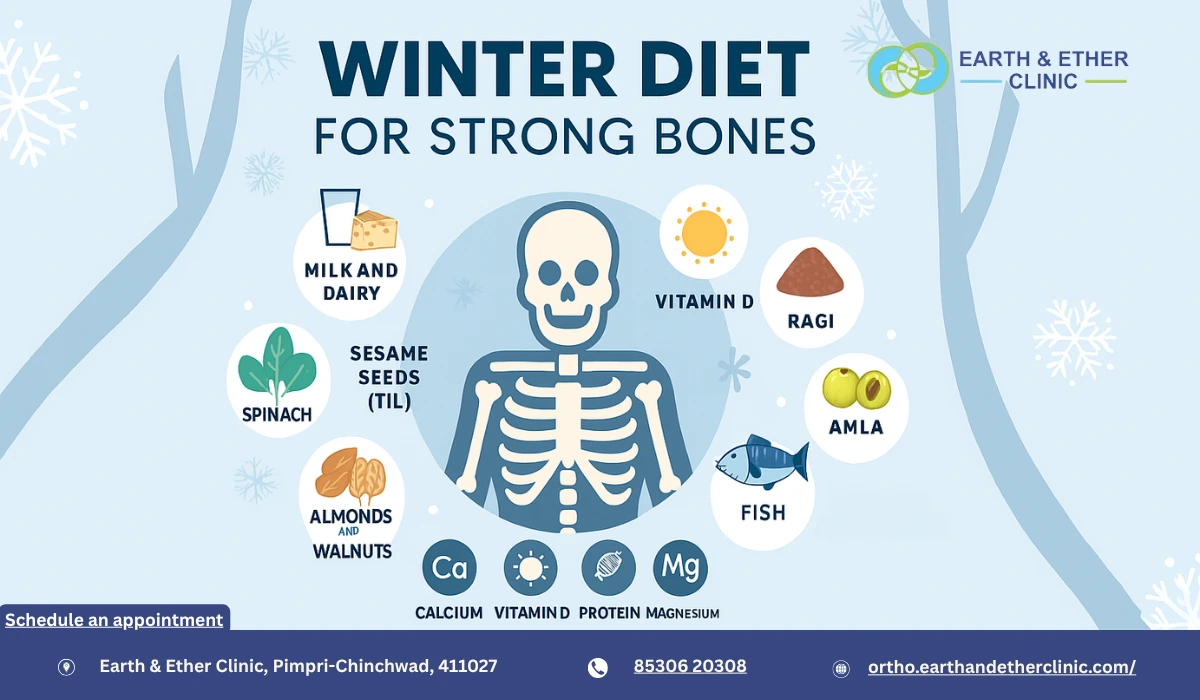Winter Diet for Strong Bones
Winter is a time when many people experience joint stiffness, aches, and a general feeling of reduced flexibility. The cold weather, limited sunlight, and reduced outdoor activity can all have an impact on bone health. This makes nutrition especially important during the season.
A well-balanced winter diet can help maintain bone strength, improve joint mobility, and reduce the risk of injuries. According to the Best Orthopedic Surgeon in Pune, bone health depends on a balanced intake of calcium, Vitamin D, protein, and other essential nutrients. Following the right bone health foods during the colder months can significantly improve overall musculoskeletal wellness.
Expert guidance from the Orthopedic Doctor In Pimpri Chinchwad emphasizes that focusing on a nutrient-rich diet is one of the most effective ways to preserve bone density, prevent joint stiffness, and support long-term orthopedic care in Pune.
Why Bone Health Declines in Winter
Several factors contribute to weaker bones and joints during the colder months:
- Reduced sunlight exposure: Limited UVB rays mean less Vitamin D synthesis, affecting calcium absorption.
- Less physical activity: Reduced outdoor movement leads to weaker muscles and decreased bone stimulation.
- Dietary imbalance: Comfort foods often lack essential nutrients needed for bone health.
- Cold temperature: Poor blood circulation increases stiffness and joint pain.
To counter these effects, your daily meals should include calcium, Vitamin D, magnesium, phosphorus, protein, and Omega-3 fatty acids.
Essential Nutrients for Strong Bones
Calcium – The Foundation of Bone Strength
Calcium is a crucial mineral that supports bone structure and density. In winter, it becomes even more essential due to lower Vitamin D levels.
Sources: Milk, yogurt, paneer, sesame seeds, ragi, almonds, spinach, broccoli, and fortified plant-based milk.
Vitamin D – The Sunshine Nutrient
Vitamin D enhances calcium absorption and maintains bone metabolism. With limited sunlight exposure, dietary sources become critical.
Sources: Egg yolks, fortified cereals, mushrooms, and fatty fish such as salmon and sardines.
Magnesium – The Supportive Mineral
Magnesium activates Vitamin D and supports the development of bone tissue.
Sources: Nuts, seeds, leafy greens, whole grains, and avocados.
Omega-3 Fatty Acids – For Joint Mobility
Omega-3s reduce inflammation, keeping joints flexible and pain-free.
Sources: Flaxseeds, walnuts, chia seeds, and fish such as mackerel.
Protein – The Building Block
Protein supports bone structure, repair, and overall muscle strength.
Sources: Lentils, beans, eggs, dairy products, tofu, and lean meats.
Best Winter Foods to Strengthen Bones
Below are nutrient-dense foods easily available during winter that help maintain bone strength:
| Food Item | Benefit |
| Sesame seeds (Til) | Excellent source of calcium and healthy fats |
| Ragi (Nachni) | High in calcium and fiber |
| Spinach and Fenugreek | Rich in iron, magnesium, and calcium |
| Carrots and Sweet Potatoes | Provide Vitamin A for bone remodeling |
| Amla (Indian Gooseberry) | High in Vitamin C for collagen formation |
| Dates and Figs | Contain calcium, magnesium, and potassium |
| Dairy (Milk, Curd, Paneer) | Complete source of protein and calcium |
| Fish (Salmon, Rohu, Mackerel) | Contains Vitamin D and Omega-3 fatty acids |
| Almonds and Walnuts | Provide magnesium and healthy fats |
| Fortified Cereals and Millets | Enriched with Vitamin D and calcium |
Warm Winter Recipes for Bone Health
Ragi Malt or Porridge
Boil ragi flour in milk, add jaggery, and top with almonds. It is rich in calcium and energy.
Sesame Seed Ladoo (Til Ke Ladoo)
A traditional sweet that provides calcium, iron, and healthy fats.
Spinach Soup with Paneer Cubes
A nutritious combination of protein, iron, and calcium.
Fish Curry or Grilled Fish
Provides Vitamin D, Omega-3 fatty acids, and lean protein.
Turmeric Milk (Haldi Doodh)
Reduces inflammation and helps relieve joint pain.
Lifestyle Tips to Support Bone Health
- Get 15 minutes of morning sunlight for Vitamin D synthesis.
- Stay physically active through yoga or indoor exercises.
- Drink enough water to support metabolism and nutrient absorption.
- Limit caffeine and alcohol, as they may affect calcium absorption.
- Go for regular bone health assessments, especially for seniors and postmenopausal women.
When to Consult an Orthopedic Specialist
Consult an orthopedic doctor if you experience:
- Persistent bone or joint pain
- Frequent fractures or injuries
- Swelling or stiffness in joints
- Difficulty in movement during cold months
Prompt consultation ensures early diagnosis and effective treatment. For professional orthopedic care in Pune, it is best to seek advice from experienced specialists who can provide a personalized approach to maintaining bone strength.
Conclusion
A carefully planned winter diet can play a vital role in maintaining bone density, preventing weakness, and reducing the risk of fractures. Focus on calcium, Vitamin D, and protein-rich foods while maintaining an active lifestyle for complete bone protection.
If you experience ongoing discomfort or wish to assess your bone health, consult the Best Orthopedic Surgeon in Pune for expert evaluation and care. Proper diet, exercise, and medical guidance together form the foundation for long-term bone wellness.
Read Here: Top 7 lifestyle habits to keep your bones and joints healthy

